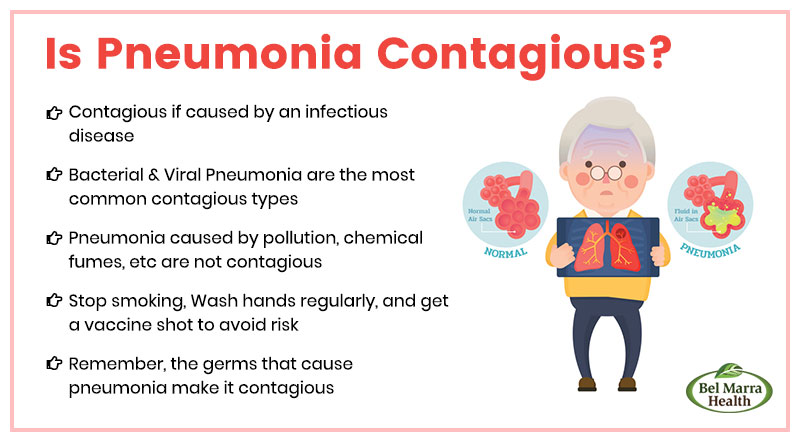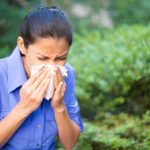 If you ever wondered whether pneumonia is contagious, we are here to address your concerns. First of all, pneumonia is inflammation of the lung tissue, caused by a virus, bacteria, or fungus. In pneumonia, the air sacs become filled with pus. What part of the lung is affected and whether it is a single lung or both determines what kind of pneumonia it is – we will explain the types of pneumonia later on.
If you ever wondered whether pneumonia is contagious, we are here to address your concerns. First of all, pneumonia is inflammation of the lung tissue, caused by a virus, bacteria, or fungus. In pneumonia, the air sacs become filled with pus. What part of the lung is affected and whether it is a single lung or both determines what kind of pneumonia it is – we will explain the types of pneumonia later on.
Pneumonia may be contagious if it is caused by an infectious microbe. But if pneumonia is caused by chemical fumes or other poisons, then it is not contagious.
Advertisement
The different types of pneumonia stem from their cause. For example, there is bacterial pneumonia and viral pneumonia. Pneumonia can also bear a descriptive name, such as community-acquired or hospital-acquired pneumonia. Most of the types of pneumonia are contagious, but not as contagious as the flu, for example.
How long is pneumonia contagious?
If treatment for pneumonia is administered early on, then the time pneumonia is contagious for is shorter. For example, a person with bacterial pneumonia will stop being contagious within two days of taking antibiotics. For other types of pneumonia – like the one that can cause tuberculosis – the treatment may have to be administered for at least two weeks before a person is no longer contagious.
On the other hand, individuals with viral pneumonia are less contagious after symptoms have subsided. The key is to reduce your ability to contaminate others by utilizing proper hygiene and avoiding others as best as possible.
Who is most likely to get pneumonia?
Although anyone at any age can contract pneumonia, there are certain groups that are at a higher risk than others. Individuals most likely to contract pneumonia include the elderly, children, people with chronic illnesses, and individuals with compromised or weakened immune systems.
Other risk factors that increase a person’s risk of pneumonia include chronic lung diseases like COPD, smoking, brain disorders, immune system problems, serious illnesses like heart failure or diabetes, a recent surgery or trauma, and ongoing cancer treatment, or surgery for the nose, throat, mouth, or neck cancer.
 Types of pneumonia
Types of pneumonia
 As we have mentioned, there are different types of pneumonia. Here’s what they are and how contagious they are.
As we have mentioned, there are different types of pneumonia. Here’s what they are and how contagious they are.
Bacterial pneumonia: Bacterial pneumonia can be caused by different types of bacteria, including streptococcal pneumonia (most common in adults), chlamydophila pneumonia, and H. influenza type B pneumonia (most common in children).
The common signs and symptoms of bacterial pneumonia include high fever, cough with phlegm, chills, chest pain when breathing or coughing, rapid breathing, shortness of breath, and loss of appetite.
Bacterial pneumonia is very contagious, so beginning antibiotic treatment right away can reduce your contagiousness.
Walking pneumonia: Walking pneumonia is a milder form of pneumonia that presents symptoms similar to a cold. Those symptoms include low-grade fever, persistent dry cough, fatigue and tiredness, shortness of breath, chest pain, and loss of appetite. Walking pneumonia is less severe than full-blown pneumonia, yet it can still be transmitted through droplet infection. Steering clear of others can help reduce transmission, along with covering your mouth and nose when coughing or sneezing.
Viral pneumonia: Viral pneumonia is caused by a virus and commonly affects children. Viral pneumonia may clear up within three weeks, but does increase the risk of bacterial pneumonia. Symptoms of viral pneumonia are similar to the flu with fever, aches, and cough. Symptoms may worsen within the first two days, then proceed to improve.
Viral pneumonia is highly contagious and can actually spread quicker than bacterial or fungal pneumonia.
Fungal pneumonia: There are three subtypes of fungal pneumonia: coccidioides, histoplasma, and cryptococcus. If a person with a weakened immune system inhales a fungus that’s how they can become sick. Symptoms include fever, dry cough, fatigue, and shortness of breath. Unlike other types, fungal pneumonia is not contagious, but symptoms may appear worse in those with weaker immune systems.
Aspiration pneumonia: Aspiration pneumonia occurs when a person inhales food or other objects into their lungs. Although not contagious, aspiration pneumonia can be life-threatening, so immediate medical attention is required.
Treatment and prevention of pneumonia
Treatment of pneumonia depends on the cause of your pneumonia. Some in-hospital treatments for pneumonia include fluids and antibiotics administered intravenously, oxygen therapy, and breathing treatments. Antibiotics are commonly prescribed for bacterial pneumonia. For viral pneumonia, other medications, which are common to treat the flu, may be prescribed.
At-home treatment is possible for pneumonia, too, including inhaling warm moist air, taking prescribed antibiotics, drinking plenty of fluids like tea, and getting as much rest as possible so your body can fight off the infection.
Advertisement
Pneumonia, like the flu and cold, can be prevented, and here are some effective prevention tips to lower your risk of pneumonia.
- Washing your hands, especially before and after touching food, after blowing your nose, after using the bathroom, after changing a baby’s diaper, and after coming into contact with someone who is sick
- Not smoking as it damages your lungs
- Getting the flu shot
- Getting the pneumonia vaccine, especially if you are at a higher risk
When should someone call a doctor for pneumonia?
 Although pneumonia often doesn’t result in complications and can be easily treated, there are certain signs that indicate a more serious problem that requires immediate medical attention. Here are some of those signs and symptoms that indicate you should see a doctor for pneumonia:
Although pneumonia often doesn’t result in complications and can be easily treated, there are certain signs that indicate a more serious problem that requires immediate medical attention. Here are some of those signs and symptoms that indicate you should see a doctor for pneumonia:
- Blood or blood-colored mucus in cough
- Aggravated breathing problems
- Worsening chest pains
- Fast or painful breathing
- Night sweats or unexplained weight loss
- Shortness of breath, chills, or persistent fever
- Worsening of symptoms after initial improvement
Pay attention to your body, and if you’re not getting better, go in and see your doctor.
